Veterinarians lend a hand in horse health
Rural Veterinary Experience Teaching and Service (RVETS) travels to rural communities that rely on horses to survive.
Next >
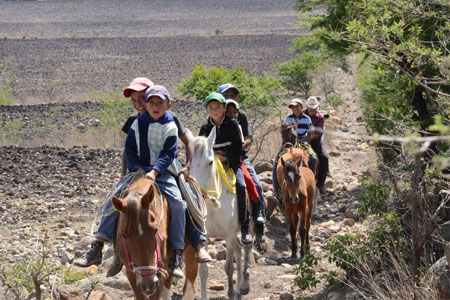
Clients travel many miles with their horses to reach an RVETS clinic in Mexico.
They had just packed the last piece of equipment in the van and were about to start an 11-hour trek to the airport when something stopped them in their tracks. Eric Davis, DVM, MS, DACVS, DACVIM, and his Rural Veterinary Experience Teaching and Service (RVETS) team spotted a local Nicaraguan man approaching on horseback.
“This fellow shows up on a horse that literally can't breathe,” Davis says. “Its nasal passages were completely collapsed-he wanted to know what we could do to help.”
Davis could have politely explained, “I'm sorry, but we really need to go.” However, it's not RVETS' style to leave a horse behind. After digging the proper supplies and equipment out of the van, the volunteer team performed a permanent tracheostomy right then and there.
Click the Next button to continue reading
All photos courtesy of Dr. Eric Davis
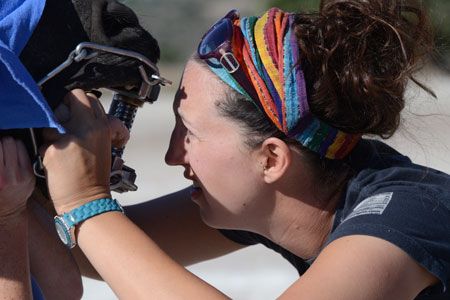
Volunteer veterinarian Shannon Finley performs an oral exam on a horse in Mexico.
“The horse got immediate relief,” Davis says. “It doesn't solve the long-term problem but until we get a handle on how to treat these fungal infections, the horse is going to live a better life.”
Cases like that one are the reason Davis started RVETS. He says the nonprofit organization's mission is to provide veterinary care primarily for horses and other equine species in underserved rural areas in the western hemisphere and utilize volunteer veterinarians and veterinary students in the process. It's actually an outgrowth of Rural Area Veterinary Services (RAVS), which Davis developed 12 years ago. (The Humane Society Veterinary Medical Association took over RAVS-click here to read more.)
Click the Next button to continue reading
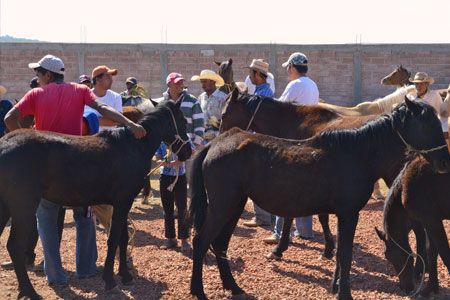
Horses and mules wait for treatment at another clinic in Mexico.
RVETS performs more than 800 horse castrations a year-a procedure that otherwise might be done by a local cowboy without anesthesia, Davis says. His team also conducts about 70 cryptorchid surgeries annually, which he says are done in the field. And when Davis says “field”-he literally means a field.
“Regardless of how little the community has, they always have a soccer field,” Davis says. “So generally that's where we set up and people bring their horses and burros to us.”
Click the Next button to continue reading
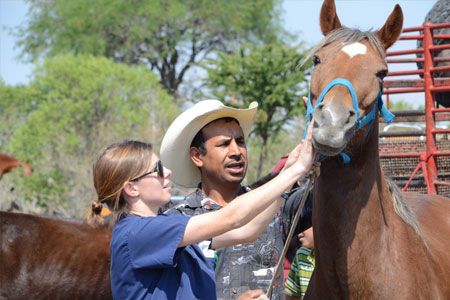
Volunteer veterinarian Jessica Collier deworms a horse.
In RVETS' target communities, the locals travel around town by way of horseback and rely on large animals for the majority of their livelihood. Davis says it's a dramatically different culture and economic situation than most Americans know.
“It's striking how many parts of the world just do not have medical care,” Davis says. “These countries don't have medical care for humans, and they certainly don't have it for animals.”
He says some people ride their horses five hours to reach an RVETS clinic. It isn't uncommon, especially in Mexico, for the RVETS team to treat more than 300 horses in one day. However, Davis doesn't like to get too caught up on the numbers. His focus is on the opportunity to work with veterinarians and veterinary students in different countries across the map.
Click the Next button to continue reading
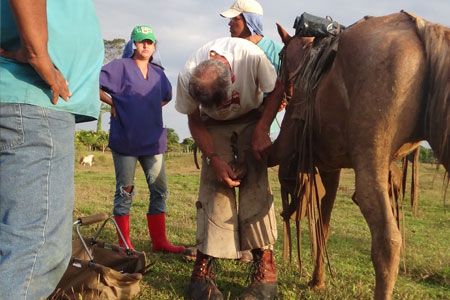
Dr. Eric Davis teaches a Nicaraguan veterinarian how to treat a sole abscess
“On our last trip to Nicaragua, all I did was work with the local veterinarians on treating foot problems,” Davis says. “We trimmed an awful lot of horse and mule feet.”
The tropical climate of the country causes these large animals to acquire sole abscesses and other foot problems. Davis was able to educate Nicaraguan veterinarians who never received the relevant training in veterinary school.
“I can catch them up to speed-it's those experiences that do the most good, really,” Davis says.
Click the Next button to continue reading
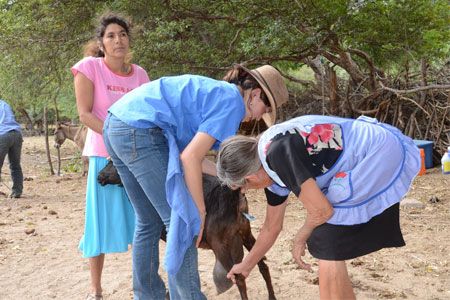
Volunteer veterinarian Fiama Gomez De Witt helps a client at an RVETS clinic in Mexico
He and his crew never show up in a city unannounced. Communities request an RVETS visit and then the volunteer veterinarians and students examine, vaccinate, deparasitize, perform dentistry and correct lay misdiagnoses and mistreatments on horses in the area. The team sets up shop for two weeks at a time and Davis says rarely a month goes by where RVETS doesn't have a mission planned.
“Veterinarians can do a lot of good in the world by providing care to animals that just don't have any other access,” Davis says. “I see my job as a cause-not a career.”
Interested in joining the RVETS initiative? Check out a schedule of upcoming trips and download a volunteer application at r-vets.org.